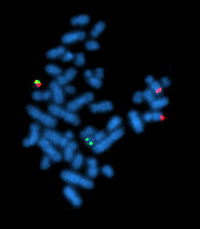
Photo from wikipedia
Abstract Although some studies found that an increased monocyte count is a predictive, short-term marker of unfavorable outcomes for patients with acute heart failure (HF), others have reported that monocytosis… Click to show full abstract
Abstract Although some studies found that an increased monocyte count is a predictive, short-term marker of unfavorable outcomes for patients with acute heart failure (HF), others have reported that monocytosis predicts prolonged survival. The current follow-up study aimed to identify different monocyte count patterns and their prognostic association with HF outcomes. Baseline blood samples for complete blood counts, differential counts, renal function tests, and lipid profiles of 303 chronic HF patients (average NYHA classification 2.8) were prospectively obtained to evaluate whether there is an association between monocyte count and clinical outcomes. Mean follow-up was 11.3 years (range 1 month to 16 years) and 111 (36.6%) patients died during follow-up. Mean monocyte count was 10.6 ± 5.5 and mean left ventricular ejection fraction (LVEF) was 36%. Patients with low monocyte counts (≤6%) had significantly lower survival rates than did those with monocyte counts 6.1% to 14%, or >14% (14.3% vs 70.2% vs. 88%, P < .001). Poorest survival was predicted for patients with NYHA class 3 to 4 and monocyte counts ≤6. Regression analysis showed that monocyte levels, NYHA class, and LVEF values were predictors of mortality, in decreasing importance. The total monocyte count was found to be an important prognostic factor that was inversely associated with predicted long-term mortality among patients with chronic HF. A low total monocyte count was strongly correlated with NYHA class and B-type natriuretic peptide levels, but no correlation was found with LVEF and oxidized low-density lipoproteins. It emerged as an independent risk factor for mortality in patients with chronic HF.
Journal Title: Medicine
Year Published: 2019
Link to full text (if available)
Share on Social Media: Sign Up to like & get
recommendations!